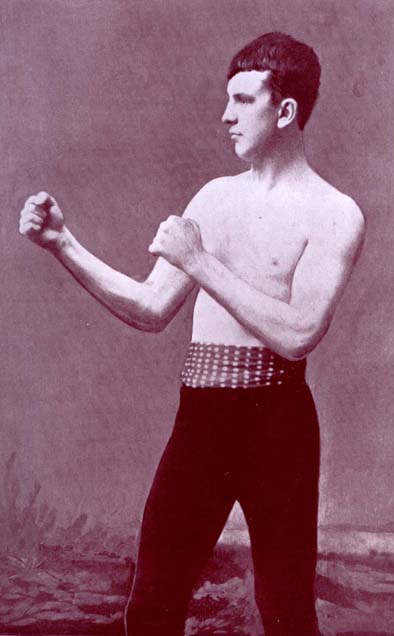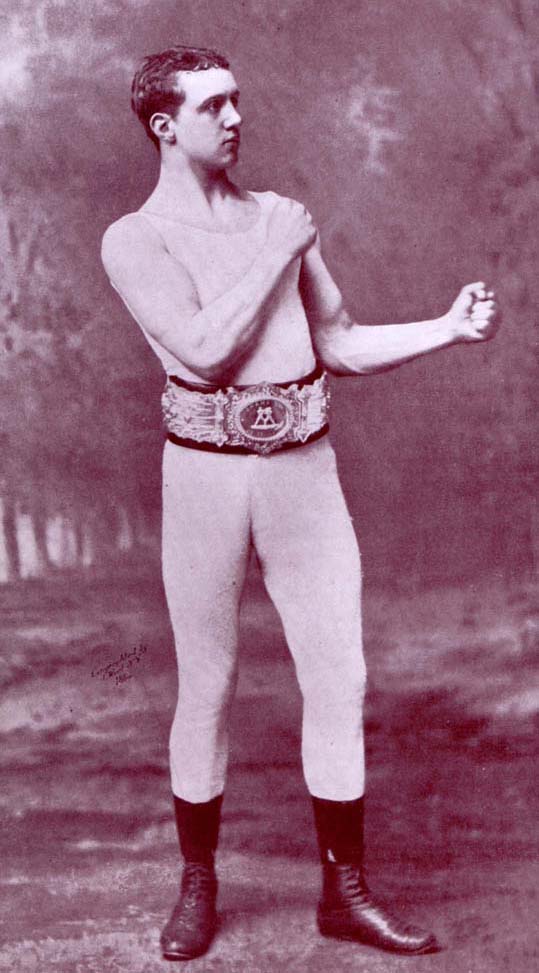JUNE 2005
Poem of the Month
By Tom Smario
Cinderella Man
Book Excerpt by Mike DeLisa
Entertaining Fighters and Prospects
By Adam
Pollack
Fatty Langtry: Pudgy
Pugilist of the Past
By Robert Carson
John Klein: 19th-Century
Trainer
Extraordinaire
By Pete Ehrmann
Ring Leader
By Ron Lipton
Incentives in Professional
Boxing Contracts
By Rafael Tenorio
Fight Town
Book Excerpt by Tim Dahlberg
The Regulation of Boxing
on Tribal
Lands:
Towards a Pan-Indian
Boxing Commission
By James
Alexander
Spotlight on Cut Man Lenny DeJesus
By Sam
Gregory
Dick Wipperman
by Pete Ehrmann
Jack Johnson: The Dates,
the Events, the Sources
by Stuart Templeton
Touching Gloves with...
"Irish" Art Hafey
by
Dan Hanley
|

JOHN KLINE:
19TH-CENTURY
TRAINER EXTRAORDINAIRE
By Pete Ehrmann
If all of the best professional boxers in the world walked through downtown Beloit, Wisconsin, at
high noon tomorrow, they'd attract as much attention as a parade of notary
publics.
For one thing, not many
people today know or care who the best boxers are, so far has boxing fallen off
the public's radar. Besides, there would be no reason for them to congregate in
this blue-collar city of about 38,000 residents located in the middle of the
state just north of the Wisconsin-Illinois border. The big attraction in local
pro sports is the Beloit Snappers, the city's minor-league baseball team.
It was different 120 years
ago, when pugilists named Charley Mitchell, Jim Hall, Jack McAuliffe, and Patsy
Cardiff were as famous and admired throughout the land as Brett Farve and Barry
Bonds are now.
And they were familiar
faces in Beloit thanks to a local man named John Kline, and his "Manly Art
Institute."
There was no more famous
training center in all the world than that established by Kline, a fine athlete
himself who ran a mile in just under five minutes in 1884, and who once won $150
betting on himself to run from Beloit to Janesville, about 12 miles up the pike,
inside of one-and-a-half hours.
Kline was also an
accomplished skater, swimmer, and wrestler, and he could perform a double
forward flip from a standing position. A member of the Fourth Wisconsin Battery
in the Civil War, Kline had signed up when he was just 16. Boxing was one of the
diversions available in camp, and Kline was a standout with the mitts.
One day after the war,
Kline appeared in an impromptu public sparring match in Chicago and was spotted
by Charles "Parson" Davis, who managed many of that era's top boxers. Davis was
so impressed with Kline that he sent one of his charges, heavyweight Patsy
Cardiff, to Beloit to train under him. That was in 1885, and before long, the
world's top fighters were beating a path to Kline's "Manly Art Institute."
Today's boxers would
probably beat a path out of town after sampling Kline's regimen. Training
methods have changed plenty since a story in the Milwaukee Sentinel of July 12,
1891, described Kline's system as a "style of martyrdom [that] in the matter of
horrors to the physical system is almost a parallel with execution by
electricity."
At Kline's 40-acre farm on
the city's western outskirts, and his downtown gym on Sixth St., Kline's clients
were pummeled, wrestled, run, and sweated into a state of hardness designed to
help them endure the rigors of prizefights that, in those days, could go on for
three to four hours.
Kline believed that a good,
bullish neck helped a fighter withstand blows to the head. To achieve that
result, the trainer would take a heavy rope and loop it around the trainee's
neck in the middle. Then Klein and a helper would grab the ends and drag the
resisting man around the room like a lassoed steer.
Step two in achieving a
trunk-like neck was for the boxer to perform a wrestler's bridge, lying on his
back and then supporting his upraised torso on his feet and rolled-back head.
Then the 190-pound Kline would stand on his stomach and chest and bounce up and
down.
Under the circumstances, a
fellow might be forgiven an occasional outburst of expletives aimed at his
tormenters and the fates. But not at the Manly Art Institute, whose proprietor
posted signs proclaiming: "Farmyard slang or profanity will not be tolerated in
this gymnasium, by order of John Kline."
Neither was booze, except
when applied to the exterior and not the interior of the athlete. Charlie
Mitchell was the British heavyweight champion who came to Kline's to prepare for
several big contests, and each day after his workout, he was hosed down with
saltwater, rubbed vigorously, and then, according to contemporary press
accounts, washed from head to foot with whiskey and lemon.
 Such a waste of his
favorite beverage must've tortured Jim Hall more than any of Kline's exercises.
A brilliant middleweight from Australia who liked his hooch so much that
sometimes he entered the ring snockered, Hall resorted to faking stomach cramps
to get a medicinal shot or two when he was at the Institute, until Kline got
wise to him.
Such a waste of his
favorite beverage must've tortured Jim Hall more than any of Kline's exercises.
A brilliant middleweight from Australia who liked his hooch so much that
sometimes he entered the ring snockered, Hall resorted to faking stomach cramps
to get a medicinal shot or two when he was at the Institute, until Kline got
wise to him.
Fighters who trained in
Beloit had a psychological as well as physical edge over their opponents. One
named Billy Bradburn had lost twice to Frank Glover when the latter had Kline as
his conditioner. Before their third match, Bradburn trained at the Manly Art
Institute and Glover didn't. As they mixed it up in the ring, a rejuvenated
Bradburn snarled, "You can't beat me tonight. I've been out to Johnny Kline's
this time!" He won, too.
Kline wasn't just an
innovator in the gym. In 1890, he was awarded a patent for a cork extractor.
He abruptly got out of the
training business in 1893, after the bibulous Hall ditched him for another
trainer just hours before his world middleweight title match in New Orleans, and
then got knocked out in three rounds by champion Bob Fitzsimmons.
"Don't mention the name
Hall in some localities about Beloit," warned the local Daily Free Press
the day after the fight. When Kline returned home, his friends threw him a
surprise party. Chances are, none of the booze on hand was used for rubbing.
After that the man the New
York Recorder called "as careful of his charge[s] as a mother of her
firstborn and as patient as Job was reported to have been," ran a tavern in
Beloit.
Kline died September 14, 1930, at age 83.
> contents <
|

